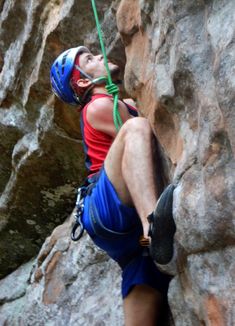By Joel Bates Oh, how we fear the harness life! Oh, how we long for it! We are haunted in our inner being by the call to something greater than ourselves, something dangerous that when chosen will hold more meaning than our meager little kingdoms ever could and will cost us our very lives. Some of us are afraid of the harness life because we have worn one before and found that it drew us to powerless and vulnerable places. Many fear the harness because when they put it on they agree to the idea that they will be climbing to new heights, facing a difficult route, and relinquishing control. People don’t wear a harness on the couch, but on the crevasse. The harness is uncomfortable, and you stand out when you are wearing one. You receive sideways glances from others and remarks of pity since they know harness wearers are likely about to climb, struggle, flail a bit, lose control, and eventually fall or at best be forced to lean back into the fabric, laying all their well-being into the integrity of something other than themselves. We come apart at times like that and the tears flow, destroying our façade that we can keep it all together on our own. Last month, Leah and I were facilitating a group of Ozark Christian College students through the ten-day Wilderness Challenge, the spiritual formation class that we offer every year. One young woman felt strangely compelled to take the class even though she was not by nature a risk taker, outdoorsy, or even brave. She was compelled by a desire to grow spiritually by embracing life outside her comfort zone. After rock climbing, she coined a phrase that resonated with our group as it described their collective decision to step into the unknown and fall into the ambiguous will of God. She called it “harness life.” After the wilderness expedition, she wrote, “The best analogy I can think of to explain life right now is that [it] felt like rock climbing—it was hard and to make it through I had to really rely on my harness (rely on God and the community He gave me). But now normal life feels like walking up stairs—it is easy enough for me to get through these days by myself. But I got used to harness life, so stairs-life feels weird. Even though I’m on stairs that I can walk up in my own power, I want to be and should be relying on the harness.” She had a mountain-top experience and was dealing with the dilemmas of reconciling what she had learned up there with how she was now going to live. One cannot have a mountaintop experience without a mountain. Difficulty is a key component that begins the moment we even consider stepping outside our comfort zone and confronting our subtle addiction to security as we look at the looming ridge, that summit so far away and high that we cannot see the outcome from our vantage point. Most people make a quick decision at this point to stay in the familiar valley of comfort and safety, but some are drawn by a belief that some deep reward lies within the mountain or within the representation of the mountain, that which is difficult. Jesus invited his disciples to such a life when He said “Come follow Me, and I will make you fishers of men.” Bonhoeffer said “When Christ calls a man He bids him come and die.” That sounds pretty dangerous to me, but the alternative to death in Christ is quite surprising. The death we are called to is a lot like the life of a climber in a harness. While we are in the harness climbing, we are aware of the possibility of falling, but the security of the harness can help us keep going higher. When we do fall or get to the top, we render our well-being to the harness. In truth, we are completely abandoned to the harness at this point. If the harness were to malfunction, we would quite literally die. So in a way, when we put on the harness, we already die because we have given ourselves over to the reality that we won’t be saving ourselves any longer. We’ve completely relied on the harness. This is the power that frees us to really climb and, thereby, really live. When Christ called his disciples to follow Him, we know from history that these men suffered greatly and died violently because of that dangerous call. Strangely, every one of them would say that it was more than worth it. They would tell us that giving over everything to Jesus resulted in the truest life they ever knew. They wouldn’t trade it for anything. I’m reminded of a quote from one of my favorite movies, Braveheart, where William Wallace faces certain death and placidly states, “Every man dies. Not every man really lives.” God in his marvelous grace sent Jesus to die so that everyone could really live. Colossians 3:3-4 says, “For you died, and your life is now hidden with Christ in God. When Christ, who is your life, appears, then you also will appear with Him in glory.” This is what I mean when I encourage you to live a “harness life.”
1 Comment
|
Come along side us as we journey in and out of the wilderness, discovering our Creator in creation.
Archives
July 2024
Categories |
Contact Us
|
|

 RSS Feed
RSS Feed

